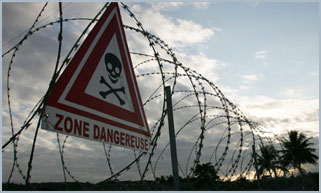
A £3bn flotation of parts of the controversial Trafigura commodities trading group could be on the cards in a move that could crystallise the wealth of 700 traders who own the Swiss company.
Trafigura has attracted international scrutiny for its links to dumping of toxic waste in the Ivory Coast and for oil trade with Iraq under the United Nations' oil-for-food programme.
Now it could be poised to enter the spotlight by spinning off its Puma Energy business, which owns petrol stations, ports and refineries in countries across the developing world.
If the share sale were to take place, it would follow Glencore, also based in Switzerland, for selecting London as the place to float. Glencore's $10bn (£6.2bn) listing last year catapulted the group into the FTSE 100 and made paper billionaires of its five executives.
Puma's chief executive, Pierre Eladari, was reported as saying the company was considering a flotation. "It's something we are prepared to do," he told the Sunday Times. "We are almost finished in terms of corporate structuring to be able to do it."
Reports that Puma could go public in the new year are thought to be optimistic. "Puma Energy is well funded by its existing shareholders and has no immediate needs to go to the public markets. As we have stated previously, an [initial public offering] could be one of various options at some point in the future," Trafigura said on Sunday.
The company declined to put a figure on the value of Puma Energy but bankers said that it could be worth about £3bn.
It is thought the group would use the money to fuel a spending spree. Puma – which focuses on the refining, transportation and sale of petrol and other products in the developing world – bought BP's southern African arm in 2010 and has bought divisions from Exxon Mobil and Chevron.
It is one of the fastest-growing parts of Trafigura's business and is expected to post profits of about $500m this year from $8bn turnover. Eladari is reported saying that could increase to $700m next year if he succeeds in buying the companies he is circling.
Trafigura is privately-owned by about 700 traders who work for the group. Listing Puma would be a means of crystallising their wealth, without ceding control of the parent group.
Trafigura sold 20% of Puma Energy to Angola's state oil company last year, reducing its stake to 65%. It is said to be keen to reduce its holding to below 50% so Puma Energy could raise its own debt.
Eladari reportedly said: "The 50% threshold is the key. At that stage, none of our financing would impact Trafigura's financing."
Trafigura was founded in 1993 by six traders who previously worked for Marc Rich – the man who broke sanctions against Iran but subsequently received a presidential pardon from Bill Clinton.
The company has been rocked by scandal since 2001, when a Trafigura-chartered tanker was intercepted in the Caribbean on suspicion of carrying illegal Iraqi crude. In a settlement, Trafigura agreed to pay a $5m fine, but was not charged with smuggling and denied wrongdoing
Then in 2010, Trafigura was found guilty of exporting toxic waste from Amsterdam, which was later dumped in the Ivory Coast, causing a public health crisis. The company agreed to pay £28.7m to compensate the 30,000 victims, although it did not accept legal liability.
Source :guardian.co.uk